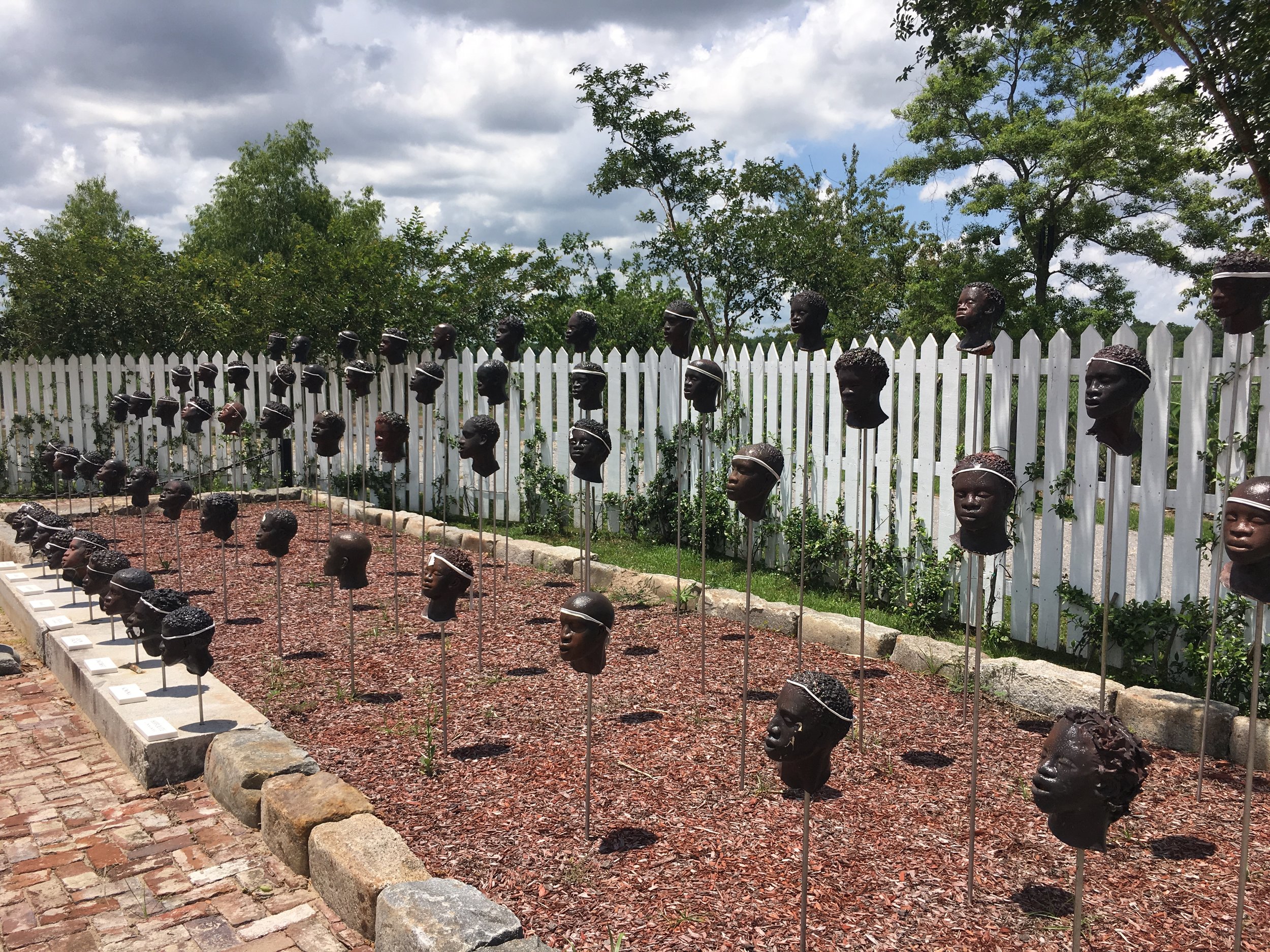Who gets to have a voice?
Who has earned the right, the respect, and the power to speak first, to be heard and recognized and validated by peers and strangers alike?
What does it mean when a group of voices systematically goes unheard and ignored?
Today I reflect on those who were strangled into silence. The people who lived and died without speaking their minds, as I am free to now. Those enslaved men, women, and children who would have been beaten if found with a book in their hands.
Their voices, their lives, and their histories, became palpable at the Whitney Plantation.
Cabins where enslaved workers lived at the Whitney Plantation
Over a century after emancipation, the Whitney Plantation is an anomaly. Of the numerous plantations scattered throughout Louisiana, it is one of the few courageous enough to honestly describe this stain of slaughter on the South. Other plantations exclusively sell the story of “Gone with the Wind”: of a gloriously romantic antebellum era, with mansions overlooking vast fields of cash crops, of gallant Southern gentlemen courting beautiful heiresses, sipping sweet tea and daydreaming about nothing at all.
In this vision, the cries of enslaved men being brutally whipped, inches from death, are muted. The cruel realities of women raped by their masters, raising children they were forced to bring into this world of merciless servitude, are censored. The remote gets grabbed and the channel is changed, from a documentary that we don’t really want to see, to a lovely whitewashed version of Southern history.
Modern plantations that tiptoe around their history of slavery are almost as dangerous as a sugar plantation was in Louisiana. The painstaking process of refining sugarcane was so unsafe that an enslaved person had a life expectancy of seven years after setting foot on the property. For the ten year olds, this meant they would likely be robbed of the chance to become an adult. Is this really a fair price for a barrel of molasses?
Kettles used in the "Jamaica Train" process of refinement, which involved pouring the scorching sugar from one open cauldron to another
This toxic element of American history makes black voices like Michael Ondaatje’s incredibly necessary. In his novel, Coming Through Slaughter, he shares the fictionalized chronicles of legendary jazz musician Buddy Bolden. Although Bolden lived in the early 20th century, the language of the novel shows how saturated Southern culture was with slavery. When Buddy breaks a window with his fist, Ondaatje parallels this rage to the not-so-distant violence of the region.
“The window starred and crumpled slowly two floors down. His hand miraculously uncut. It had acted exactly like a whip violating the target and still free, retreating from the outline of a star.”
Like the hand of Buddy Bolden striking a window pane, white Southern plantation owners were left relatively unscathed by their own cruelty. Yet formerly enslaved individuals continued to suffer, even after President Lincoln’s Emancipation Proclamation of 1863. Newly freed families had no choice but to become sharecroppers on the same plantations where they were previously disenfranchised. They fell perpetually indebted to their old masters, thanks to deliberately high living costs and low wages. These people were fettered first by men, and later by debt. Such desperate financial situations followed certain black communities into later centuries, pushing young people into whatever jobs they could find.
“And since the death of Mr Bass all [his] daughters had slipped successively into the red light district. Bolden in fact had slept with each of Nora’s sisters in his time.”
A description of Countess Piazza's brothel in a Storyville blue book
(from knowlouisiana.org courtesy of The Historic New Orleans Collection)
Approximately 2,000 prostitutes worked the streets of the district of Storyville in New Orleans in the early 1900s. In the blue books that served as an index of the Storyville district's prostitutes, women of color were labeled with a "C" or described as an "octoroon". This allowed them to be marketed to men who fetishized them for being "exotic". These women were again commodified, like their mothers, fathers, and grandparents sold into slavery. Years had gone by, yet black people still could not define themselves, could not have a voice, could not exist without being objectified or devalued for their skin color.
The burden of living in a society that seriously limited opportunities for and discriminated against blacks is a lot to carry. Bolden dealt with it by enjoying copious amounts of alcohol, music, and women, in addition to a more unconventional method. In the novel, Buddy abandons his wife and children for two years, to live in near isolation with a woman Buddy loves and her husband, in an area where he was a complete stranger. Landscape suicide: wipe the slate clean, and you can be whoever you say you are.
“He could just as easily be wiping out his past again in a casual gesture, contemptuous. Landscape suicide.”
How tempting it must have been for him to escape the world. To go somewhere far away from the people who think they know you, who saw you grow up and grow old and fall in and out of love with people, places, things that you’ve seen so often you can taste them in your dreams. Going somewhere, anywhere, where you alone get to decide what the world sees of you? No wonder Buddy was prone to committing landscape suicide. This was his way to have a voice. This was how he could speak; this was his way to tell others who he was, without being told first.
When we think of history, whose voices do we hear?
Which voices are accurately preserved over time?
Which voices are swallowed up by a self-righteous majority?
Slave songs are profound because they embody the emotions, intensity, and tenacity of the people who performed them. According to descriptions of Buddy Bolden's music (as he was never recorded), his performances shared this resonance. These melodies expressed everything about who Bolden and those enslaved were, without really saying anything at all. The language of music gave them a voice, if only for a few minutes, that their oppressors could not deny.
Ondaatje’s message in his title, “Coming Through Slaughter”, also speaks volumes. Coming through, processing, recovering, healing from the slaughter, the injustice, the murder of black people everywhere in the South. It isn’t a process that is easy nor efficient. Post-war, they were coming through slaughter. Post-Reconstruction: coming through slaughter. Post-Emmett Till, post-Dr. Martin Luther King, Jr., post-Michael Donald. Still, today, coming through slaughter.
Memorial for the hundreds of escaped insurgents killed in the 1811 German Coast Uprising



